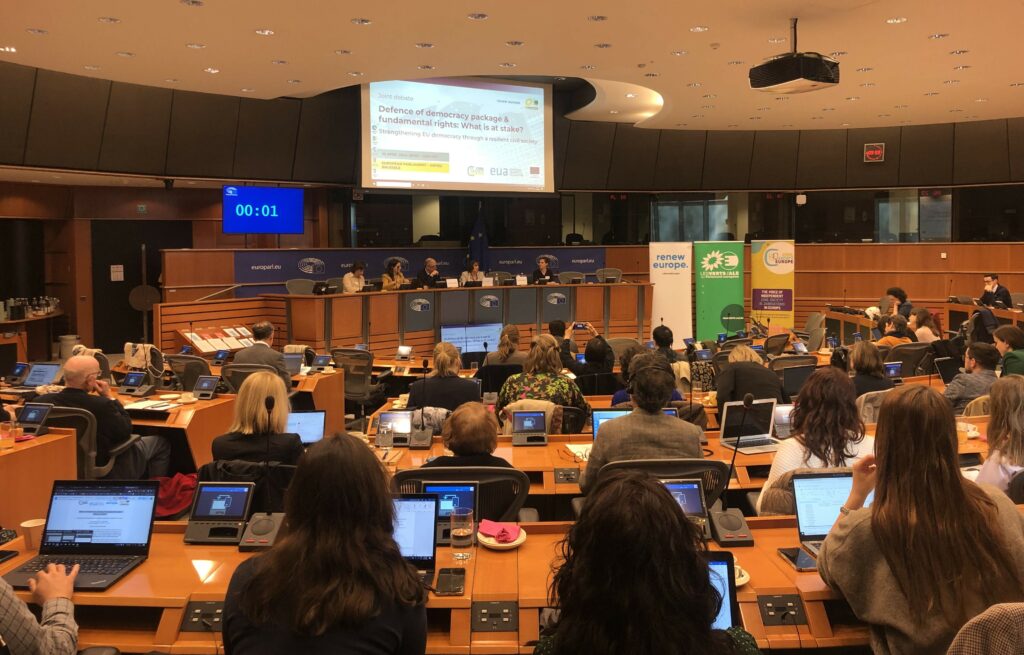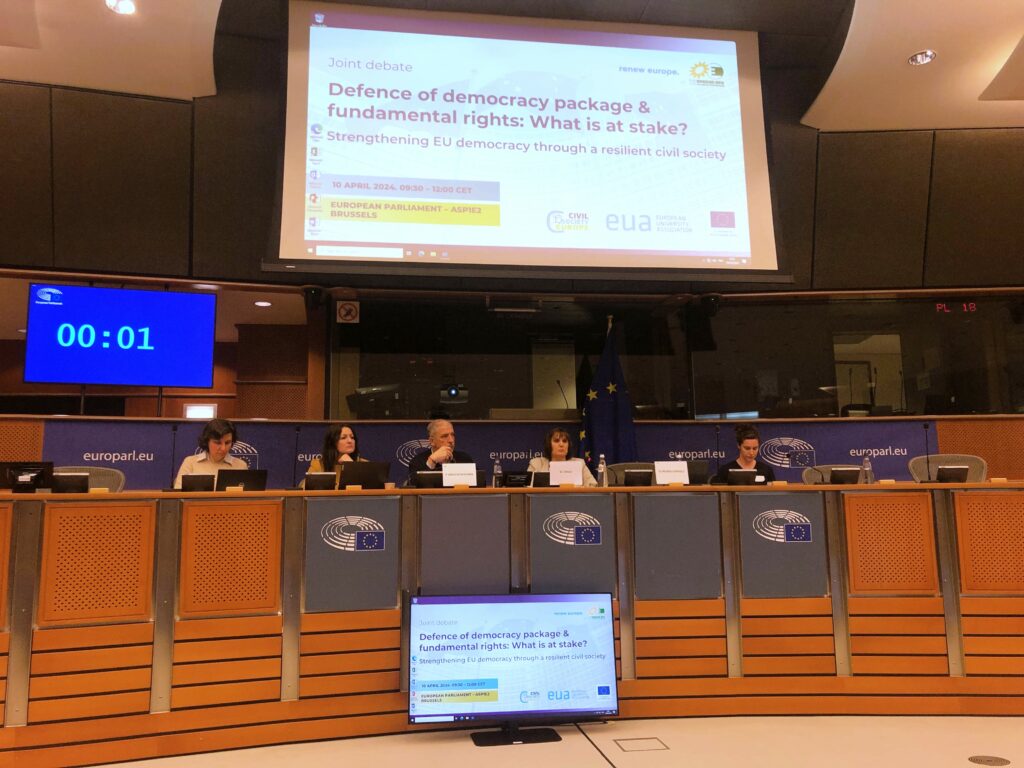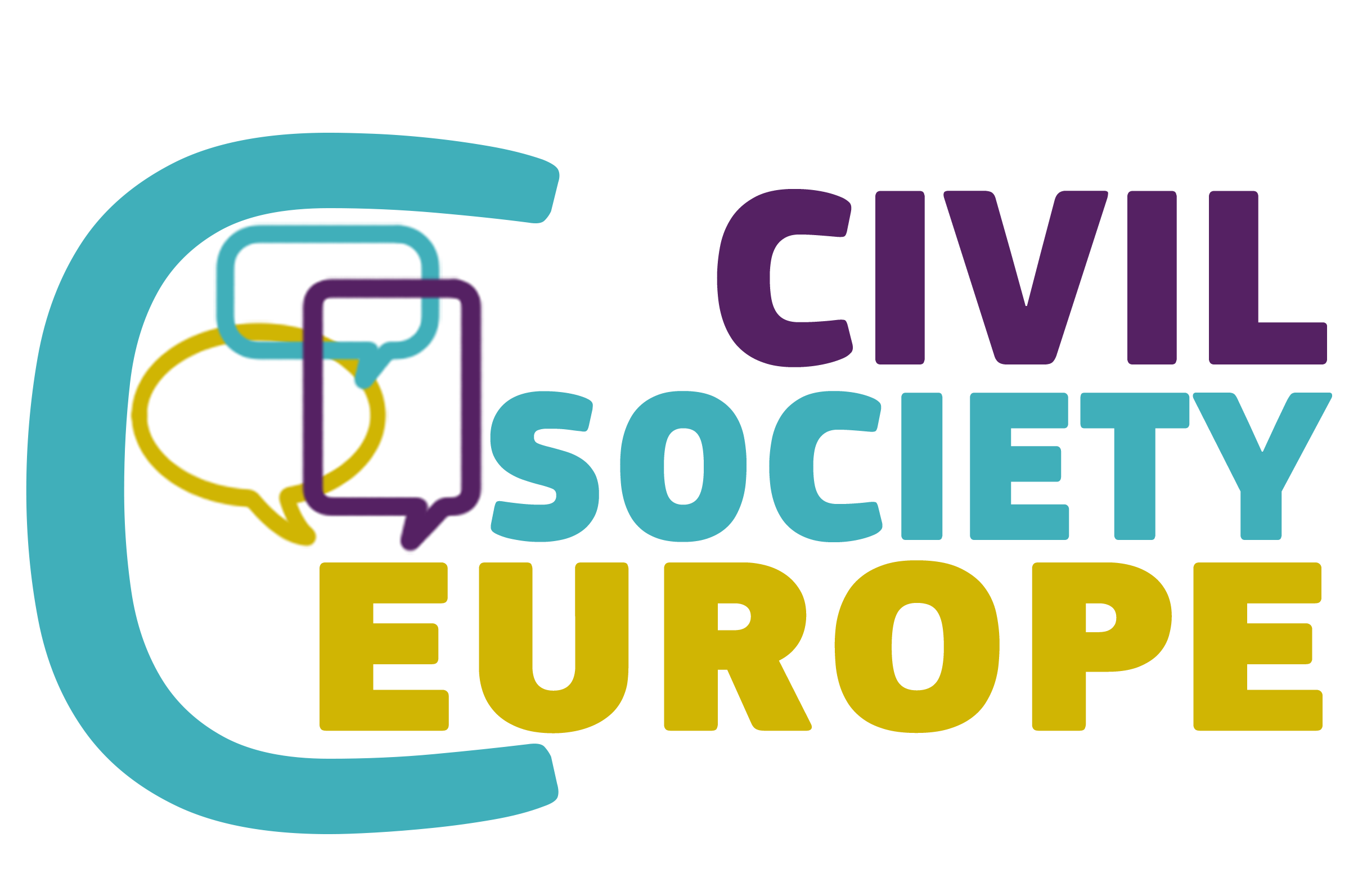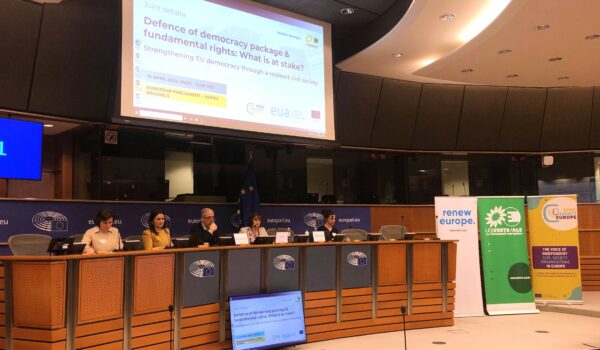Read here civil society’s common analysis of the proposed Directive.
On 10 April 2024, nearly 100 people from civil society, academia and the EU institutions gathered at the European Parliament (EP) in Brussels, Belgium, for the event “Defence of democracy package & fundamental rights: What is at stake?”. The event was hosted by MEP Anna Donáth (Renew Europe, HU) and co-organised by Civil Society Europe (CSE) and the European University Association (EUA), with the support of the EP groups Renew Europe and Greens/EFA and the European Commission (EC)’s Citizens, Equality, Rights and Values (CERV) programme. The event dealt with the proposed Directive on transparency of interest representation carried out on behalf of third countries, which is part of the EC’s Defence of Democracy (DoD) Package. Our event stemmed from CSE and EUA’s joint letter (25 January 2024) that underlined that the proposed Directive does not address the problem of interference in democratic processes and poses an alarming threat to civic space and academic freedom.
Civil society organisations’ and academia’s concerns were shared by the event’s host, MEP Anna Donáth, who recalled the foreign agent law in Hungary and issued a warning about how EU governments could use the aforementioned proposed Directive to shrink civic space. In fact, the proposed Directive is already among the priorities of the upcoming Hungarian Presidency of the Council of the EU. MEP Donáth noted the importance of this event, co-organised by CSE and EUA, as it gives voice to civil society organisations (CSOs)’ and academia’s concerns.
Thomas Jørgensen, EUA’s Director of Policy Coordination & Foresight, recalled that the proposed Directive will not achieve its aim and will just impact academic freedom, while universities have decades of experience with safe international cooperation.
In the panel discussion, Gabriella Civico, CSE’s President, introduced the debate by highlighting that civil society is a key ally for institutions and governments in efforts against disinformation and attempts to undermine democracy. She noted that because of this engagement on the ground, civil society knows that the proposed Directive in its current shape will negatively impact fundamental rights while distorting the attention to the real threats to democracy, which are beyond the scope of the EC’s proposal.

The EP’s rapporteur on this file, MEP Pablo Arias Echeverría (EPP, ES) underlined that the European project is at risk, also due to foreign interference, and that EU legislation on transparency of interest representation is needed. The EC’s intentions, according to the rapporteur, are good and the DoD Package can be useful, but several critical points need to be analysed with the various stakeholders, including civil society. For this reason, the process has not been rushed in the EP; instead, the rapporteur has presented a working document that will feed into discussions during the next EP term (2025-2029).
Christel Vacelet, Head of the International Office of the Université Catholique de Louvain, shared with the event’s audience the decades of experience with research collaboration in the university sector. She also spoke about the ongoing debate in academia on the ways to continue international collaboration in an increasingly hostile international environment. Using the motto ‘As open as possible, as close as necessary’, the academic sector at national and EU levels and the EU institutions are discussing and working together to develop common guidelines at the EU level on how to perform risk assessments when collaborating with third countries; universities already perform such assessments. Such collaborations with third countries have to respect sensitive sectors, academic freedom, human rights, dual-use legislation and the safety of academic personnel. Vacelet underlined that universities already have a system of accountability, both internal and external, and the information on the universities’ partnerships are already available. The proposed Directive would not help in providing more transparency, while risking overburdening universities with reporting duties due to the vagueness of the definitions included in the EC’s proposal and the number of international collaborations that universities have.
Linda Ravo, Human Rights Associate at the Office of the United Nations High Commissioner for Human Rights (OHCHR), shared the concerns that the High Commissioner has had about the proposed Directive since its inception phase: the High Commissioner wrote to EC President von der Leyen to express concern about the legal proposal, then welcomed the proposal’s postponement to do a proper impact assessment and offered to help with the latter. The EC did not follow up on this offer. The High Commissioner has concerns about the proposed Directive’s measures not being in line with the principles of necessity and proportionality, and that the vagueness of the definitions used in the proposal creates an opportunity for abuses. The proposed Directive’s approach can fuel the narrative that CSOs that engage with third countries support malign interference. Foreign interference and disinformation are real threats but the current proposal is not the most effective tool to address these concerns. Based on other cases in the world, there is evidence that foreign interference legislation has had the effect of shrinking civic space. Foreign interference is a complex issue, and there is no universally agreed definition of the line between legitimate and malign engagement with third countries. A public register will not be enough to make societies resilient to malign foreign interference. We need a more enabling environment for civic space, which would support a free and diverse communication environment, and promote critical thinking.
MEP Gwendoline Delbos-Corfield (Greens/EFA, FR) noted that civil society is creating a European public sphere from the grassroots level, and that CSOs’ expertise is crucial for the EU institutions’ policymaking. Therefore, a DoD Package that does not include anything about CSOs but on the other hand includes a proposed Directive that can criminalise CSOs is highly problematic. MEP Delbos-Corfield indicated that civic space has been shrinking in EU Member States like Hungary, Poland, Greece and France, and that the worst interference in democracy comes from political parties and governments, not journalists and civil society. Moreover, fossil fuel companies are the ones that use foreign funds to support disinformation. MEP Delbos-Corfield stressed the importance of a European Statute for CSOs that would recognise their role in the EU and that could be accompanied by measures on transparency and capacity-building.

Alexandrina Najmowicz, Secretary General of the European Civic Forum and CSE Board member, stressed that CSOs provide services for the common good and for people who are left behind, not services for those who fund CSOs, regardless of where the funding source is from. CSOs share the EC’s concern about covert foreign interference but the proposed Directive would not help identify actors who engage in malign interference; instead, it would put in the spotlight and potentially stigmatise legitimate interest representation by CSOs. The proposal does not stem from a thorough evidence base, and the vagueness of the definitions used in it opens the path for arbitrariness and possible abuse. Moreover, there is growing distrust from institutions in every Member State towards CSOs. The proposed Directive would fuel this growing distrust towards CSOs while diminishing the EU’s ability to respond to foreign agent laws that are developed inside and outside of the EU; indeed, other countries are seeing in this Directive a justification for theirs, as is happening in Georgia. Given all this, the proposed Directive should be carefully analysed, including from a human rights point of view by the EU Fundamental Rights Agency, and it should include a distinction between for-profit activities done by various stakeholders and advocacy activities done by CSOs as part of freedom of expression.
During the open debate, contributors underlined the impact that the proposed Directive can have on civil society inside and outside the EU. For instance, it could impact the cooperation between civil society in Ireland and Northern Ireland (due to the UK being a ‘third country’); indeed, the proposal risks undermining the Good Friday Agreement, and being in breach of the Northern Ireland Protocol signed between the EU and the UK as part of the Withdrawal Agreement. In the Western Balkans, where civil society is dependent on funding from third countries, governments could use the proposed Directive as an excuse to crack down on dissent. Such problems are present also in the EU. For instance, Slovakia is working on a foreign agents law that could use the proposed Directive as an excuse. In Romania, the far-right is already singling out CSOs in lists of unpatriotic people. Meanwhile, France is going to adopt, using an accelerated procedure, a proposal to combat foreign interference that contains the same language as the proposed Directive and even enlarges the latter’s scope.
Lastly, some participants and speakers expressed concerns about the EP JURI Committee rapporteur’s proposal (MEP Guy Lavocat, Renew Europe, FR) to expand the scope of the proposed Directive so that it includes cultural and religious activities, thereby mirroring what is already happening in France, which has raised concerns within the framework of the EC’s annual Rule of Law Report. Furthermore, the rapporteur’s proposal to expand the scope so that it includes indirect influence, even though it is already challenging to define direct influence, means giving free rein to the EU Member States’ governments to use the proposed Directive at their discretion. This, coupled with the increased financial fines for non-compliance with the proposed Directive — CSOs would have to pay a fine consisting of 6% of their global income instead of 1%, and natural persons would have to pay 30,000 EUR instead of 1,000 EUR — will have a chilling effect on civil society and on academic international cooperation.
Interested in learning more? Read here civil society’s common analysis of the proposed Directive.


